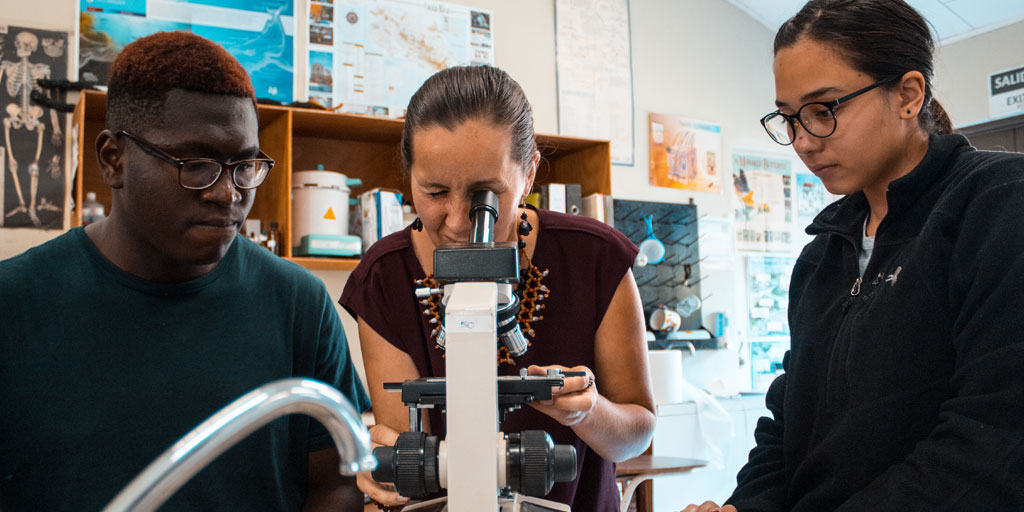
Industry-university partnership creates benefits that ripple across educational and innovation ecosystems. Since the 1970’s, universities and industry partners have combined resources and expertise to develop groundbreaking research opportunities that have long term positive economic and societal impacts. From the medical field to AI development, research generated from these collaborations have led to breakthrough technologies across the STEM ecosystem.
The National Science Foundation’s (NSF) Industry–University Cooperative Research Centers (IUCRC) program facilitates close partnerships between the US government, industry innovators and academic teams that fast-track scientific research that otherwise would remain unexplored. VentureWell leads the assessment and measurement of Center outcomes across the IUCRC program, evaluating how industry and university collaboration builds sustained partnerships and vibrant innovation ecosystems.
training tomorrow’s innovators and entrepreneurs
Entrepreneurial ecosystems thrive when they are dynamic; partnerships formed and sustained across ecosystem stakeholders — including universities, foundations, industry actors, and nonprofits — fortify the options that innovators have when developing and commercializing new solutions to global problems. Universities have also looked to strengthen industry partnerships to expand experiential learning and employment opportunities for students, which help students develop the skills and training they need to start solving problems as soon as they enter the workforce.
At the University of Michigan’s Center for Entrepreneurship, the TechLab: Climate Change fellowship program allows students to work alongside startups working in environmental sustainability. These include LanzaTech, a carbon recycling company that uses microbes to transform waste exhaust from steel mills into ethanol, and SkyBaron, which creates consumer products using captured and recycled carbon.
These kinds of programs enable students to expand their academic research outside of a silo, transforming their discoveries into solutions in real-time. In some programs, students gain key insights into the process of commercializing research, which can strengthen their business skill sets and open doors for future entrepreneurial paths. Students can also make vital connections with industry leaders and build their network through these placements, all while under the mentorship of academic and industry advisors.
“Student teams are working with startup companies in a selected technology space, and that gives them an unparalleled experiential learning opportunity to be knee deep into the development and growth period of these companies,” explained University of Michigan Faculty Grants recipient Volker Sick in a recent profile with VentureWell. “It’s just a groundbreaking experience for many of the students. In return, the startups, being fully integrated in this educational process, receive access to test facilities and research opportunities.”
connecting industry with top talent
Industry is fueled by innovation — fresh ideas and creative thinkers are always in high-demand at startups and Fortune 500 companies all over the country. University-industry partnerships ensure that industry partners forge connections with the forefront leaders of tomorrow across the STEM landscape.
“We live in a fast-paced world of ideas,” says Marc Sedam, vice provost for Innovation and New Ventures at the University of New Hampshire. “Universities provide the earliest look at where the next big idea will come from. Companies who are aligned with early-stage research see early signals of what’s going to be the next big opportunity, and they get a head start on competition.”
When companies collaborate with universities, they gain access to world-class academic experts whose research can catalyze new life-saving products. At Arizona State University, biomedical engineer Thurmon Lockhart developed the Lockhart Monitor, an app that can accurately predict the risk of falling for elderly, obese, and orthopedic patients. The technology was created in partnership with the Center for Building Reliable Innovation and Advances in Neurotechnology (BRAIN), an IUCRC that focuses on designing effective and affordable neurotechnology products.
“Collaborating with the BRAIN Center not only helped me to validate the device but also helped me to realize what intellectual property was worth commercializing,” says Lockhart in an interview with IUCRC.
advancing scientific discoveries for all
As became evident during the Covid-19 pandemic, the advancement of basic scientific discovery relies on the small steps of progress that occur across time and geography in universities and research facilities across the world.
At the University of California, Irvine, researchers have developed a new way to isolate and test a single cell, which can help researchers try a variety of drug treatments dramatically faster and less expensive, and even develop personalized treatments for patients. Using this technology, scientists are also studying the communication between healthy and diseased cells, which can have huge implications for illnesses such as cancer. Their work is made possible through a partnership with the Center for Advanced Design and Manufacturing of Integrated Microfluidics, an IUCRC funded by the NSF.
This kind of research serves as anchors to large-scale scientific innovation but it’s not cost-effective for corporations to develop themselves. The funding provided by industry partners is leveraged up to 40 times by universities, meaning that a $50,000 grant creates up to $2 million in additional research. By providing crucial funding dollars to universities, student and faculty scientists have the capacity to pursue both fundamental and experimental research, which companies can leverage in real-world applications.
University-industry partnerships unite the resources of key ecosystem stakeholders and expand the impact of STEM innovation. Government and corporate dollars are maximized to the benefit of all; faculty scientists can pursue and advance trailblazing research; and student innovators gain valuable experience and mentorship while contributing to real-world problem solving. From climate change to cancer treatment, university-industry collaboration leads to pioneering solutions to the world’s greatest problems.
For more information on the achievements of university-industry partnerships, check out the IUCRC website.